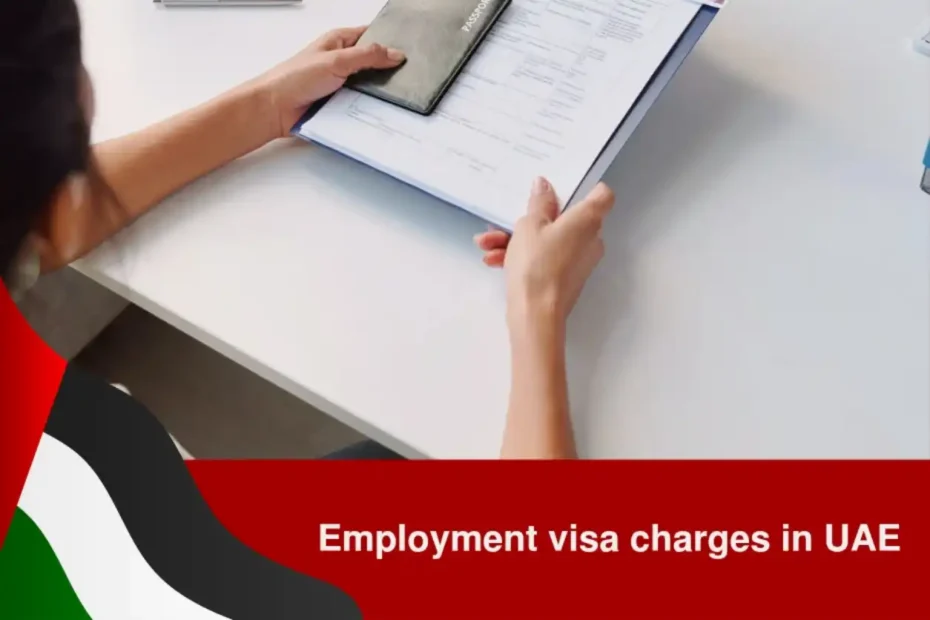In recent weeks, a mid‑sized UAE company preparing to hire overseas talent encountered unexpected figures under the new employment visa charges in UAE, which led to operational delays and budget overruns. This highlighted how a lack of clarity about employment visa charges in UAE—also referred to as work permit costs or processing fees—can impact both employers and expatriate job-seekers.
Whether you’re an employer or prospective employee, understanding these employment visa charges in UAE is essential — not just in theory, but in real financial terms.
Need legal help with UAE visa fees? Click on the WhatsApp icon below.
Table of Contents
What Are Employment Visa Charges in UAE?
Before hiring a foreign national, employers must navigate a range of mandatory expenses. Below is a summary of the key costs involved in securing a UAE work visa.
1. Work Permit (Labour Card) Issuance & Renewal
Costs range from AED 250 to AED 3,450 depending on company classification—Category A, B, or C—as per the official UAE Government portal.
2. Initial Approval Fees
Employers pay AED 200 for initial electronic permit approval. Final approval varies based on company classification.
3. Medical Examination & Emirates ID
These are mandatory for all foreign workers. They include biometric enrollment and basic health screening.
4. Residency Visa & Stamping Fees
Once the entry permit is issued and the medical test cleared, the employee’s residency visa is stamped on their passport.
5. Senior Worker Surcharge
Employees aged 65 and older incur an extra charge, which is a one-off mandatory government fee.
What Influences Employment Visa Charges?
The final cost of obtaining a UAE work visa can vary based on multiple organizational and employee-specific factors. Let’s explore what determines the fee structure.
- Company Classification (A/B/C) – Higher-risk or non-compliant companies face elevated charges.
- Geographic Jurisdiction – Mainland firms and free zone entities operate under distinct visa pricing systems.
- Employee Age – Elderly expatriates trigger higher costs due to additional health and risk factors.
- Additional Services – Non-standard processes like status changes or inside-country conversions add to total cost.
- Latest Federal Regulations – Ongoing updates to UAE labor and immigration rules directly affect fee schedules.
Legal Framework & Employer Responsibilities
Under UAE law, the responsibility of covering employment visa costs rests solely with the employer. Here’s a look at the legal basis and the implications for non-compliance.
According to Article 6 of Federal Decree‑Law No. 33/2021, employees cannot be charged for recruitment or visa costs, whether directly or indirectly. Failure to comply may result in fines or sanctions from MOHRE.
Cost-Saving Strategies for Employers
Planning wisely can reduce the financial and legal burden of visa issuance. These strategies can help companies minimize outlay while remaining compliant.
- Upgrade compliance status to benefit from lower-tier charges.
- Use free zone visa schemes where suitable.
- Anticipate and account for costs associated with older employees.
- Combine required services where possible to reduce redundant fees.
- Stay current with legislative updates impacting visa fees.
Practical Cost Estimates
To help with planning, here’s a typical range of employment visa charges based on actual data from government and corporate service providers.
| Item | Estimated Cost (AED) |
|---|---|
| Work Permit (Category 1–3) | AED 250 – AED 3,450 |
| Medical + Emirates ID | AED 700 – AED 980 |
| Residency & Stamping | AED 4,000 – AED 7,000 |
| Senior Worker Surcharge (65+) | + AED 5,000 |
| Total (Mainland, Cat 3) | AED 5,950 – AED 12,430 |
| Total (Free Zone, mid-range) | AED 3,500 – AED 6,500 |
FAQ
Navigating the new employment visa charges in the UAE demands precision and planning. Knowing your obligations and options as an employer or foreign hire will reduce risks and facilitate smoother onboarding.
Effective planning and compliance will help your company manage costs, avoid legal pitfalls, and focus on its growth—without surprises. Always ensure that employment visa charges in UAE are budgeted and paid by the employer, not the worker.
Protect your company from costly fines and legal disputes. Contact our employment lawyers in Dubai,via the WhatsApp icon below for professional support with UAE visa processes.
Read more about Visa Cancellation UAE Labor Law Dubai.
A legal consultant and legal expert in the United Arab Emirates. He publishes selected articles on the website and writes in various categories of UAE law, with a particular focus on labor law.
